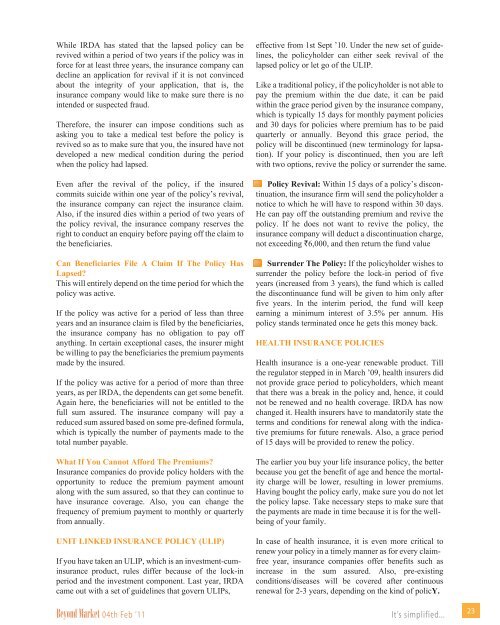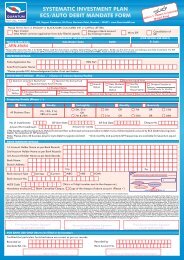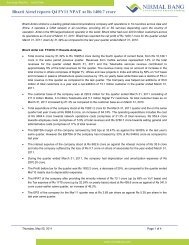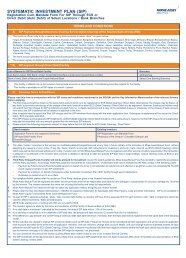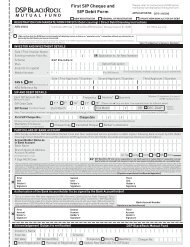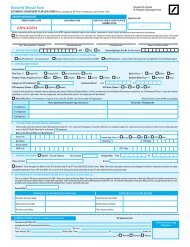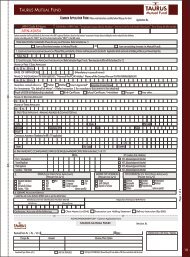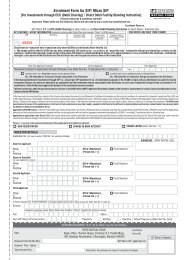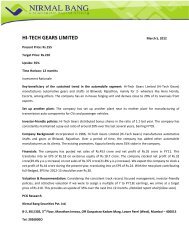to 54646 Contact Person: Sagar Karvat - 077383 80033, e-mail
to 54646 Contact Person: Sagar Karvat - 077383 80033, e-mail
to 54646 Contact Person: Sagar Karvat - 077383 80033, e-mail
You also want an ePaper? Increase the reach of your titles
YUMPU automatically turns print PDFs into web optimized ePapers that Google loves.
While IRDA has stated that the lapsed policy can be<br />
revived within a period of two years if the policy was in<br />
force for at least three years, the insurance company can<br />
decline an application for revival if it is not convinced<br />
about the integrity of your application, that is, the<br />
insurance company would like <strong>to</strong> make sure there is no<br />
intended or suspected fraud.<br />
Therefore, the insurer can impose conditions such as<br />
asking you <strong>to</strong> take a medical test before the policy is<br />
revived so as <strong>to</strong> make sure that you, the insured have not<br />
developed a new medical condition during the period<br />
when the policy had lapsed.<br />
Even after the revival of the policy, if the insured<br />
commits suicide within one year of the policy’s revival,<br />
the insurance company can reject the insurance claim.<br />
Also, if the insured dies within a period of two years of<br />
the policy revival, the insurance company reserves the<br />
right <strong>to</strong> conduct an enquiry before paying off the claim <strong>to</strong><br />
the beneficiaries.<br />
Can Beneficiaries File A Claim If The Policy Has<br />
Lapsed?<br />
This will entirely depend on the time period for which the<br />
policy was active.<br />
If the policy was active for a period of less than three<br />
years and an insurance claim is filed by the beneficiaries,<br />
the insurance company has no obligation <strong>to</strong> pay off<br />
anything. In certain exceptional cases, the insurer might<br />
be willing <strong>to</strong> pay the beneficiaries the premium payments<br />
made by the insured.<br />
If the policy was active for a period of more than three<br />
years, as per IRDA, the dependents can get some benefit.<br />
Again here, the beneficiaries will not be entitled <strong>to</strong> the<br />
full sum assured. The insurance company will pay a<br />
reduced sum assured based on some pre-defined formula,<br />
which is typically the number of payments made <strong>to</strong> the<br />
<strong>to</strong>tal number payable.<br />
What If You Cannot Afford The Premiums?<br />
Insurance companies do provide policy holders with the<br />
opportunity <strong>to</strong> reduce the premium payment amount<br />
along with the sum assured, so that they can continue <strong>to</strong><br />
have insurance coverage. Also, you can change the<br />
frequency of premium payment <strong>to</strong> monthly or quarterly<br />
from annually.<br />
UNIT LINKED INSURANCE POLICY (ULIP)<br />
If you have taken an ULIP, which is an investment-cuminsurance<br />
product, rules differ because of the lock-in<br />
period and the investment component. Last year, IRDA<br />
came out with a set of guidelines that govern ULIPs,<br />
Beyond Market 04th Feb ’11<br />
effective from 1st Sept ’10. Under the new set of guidelines,<br />
the policyholder can either seek revival of the<br />
lapsed policy or let go of the ULIP.<br />
Like a traditional policy, if the policyholder is not able <strong>to</strong><br />
pay the premium within the due date, it can be paid<br />
within the grace period given by the insurance company,<br />
which is typically 15 days for monthly payment policies<br />
and 30 days for policies where premium has <strong>to</strong> be paid<br />
quarterly or annually. Beyond this grace period, the<br />
policy will be discontinued (new terminology for lapsation).<br />
If your policy is discontinued, then you are left<br />
with two options, revive the policy or surrender the same.<br />
���� Policy Revival: Within 15 days of a policy’s discontinuation,<br />
the insurance firm will send the policyholder a<br />
notice <strong>to</strong> which he will have <strong>to</strong> respond within 30 days.<br />
He can pay off the outstanding premium and revive the<br />
policy. If he does not want <strong>to</strong> revive the policy, the<br />
insurance company will deduct a discontinuation charge,<br />
not exceeding `6,000, and then return the fund value<br />
���� Surrender The Policy: If the policyholder wishes <strong>to</strong><br />
surrender the policy before the lock-in period of five<br />
years (increased from 3 years), the fund which is called<br />
the discontinuance fund will be given <strong>to</strong> him only after<br />
five years. In the interim period, the fund will keep<br />
earning a minimum interest of 3.5% per annum. His<br />
policy stands terminated once he gets this money back.<br />
HEALTH INSURANCE POLICIES<br />
Health insurance is a one-year renewable product. Till<br />
the regula<strong>to</strong>r stepped in in March ’09, health insurers did<br />
not provide grace period <strong>to</strong> policyholders, which meant<br />
that there was a break in the policy and, hence, it could<br />
not be renewed and no health coverage. IRDA has now<br />
changed it. Health insurers have <strong>to</strong> manda<strong>to</strong>rily state the<br />
terms and conditions for renewal along with the indicative<br />
premiums for future renewals. Also, a grace period<br />
of 15 days will be provided <strong>to</strong> renew the policy.<br />
The earlier you buy your life insurance policy, the better<br />
because you get the benefit of age and hence the mortality<br />
charge will be lower, resulting in lower premiums.<br />
Having bought the policy early, make sure you do not let<br />
the policy lapse. Take necessary steps <strong>to</strong> make sure that<br />
the payments are made in time because it is for the wellbeing<br />
of your family.<br />
In case of health insurance, it is even more critical <strong>to</strong><br />
renew your policy in a timely manner as for every claimfree<br />
year, insurance companies offer benefits such as<br />
increase in the sum assured. Also, pre-existing<br />
conditions/diseases will be covered after continuous<br />
renewal for 2-3 years, depending on the kind of policY.<br />
It’s simplified...<br />
23


